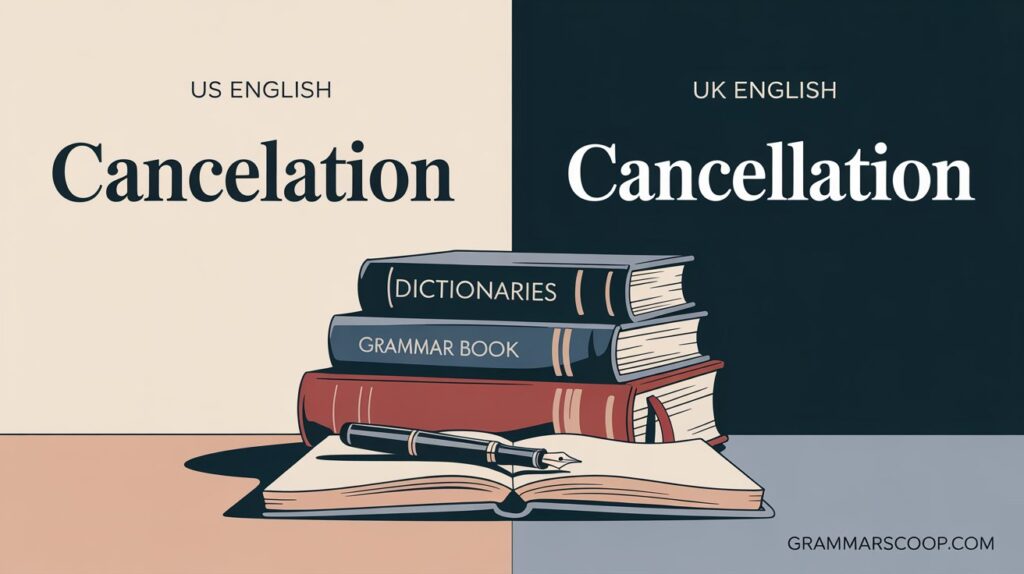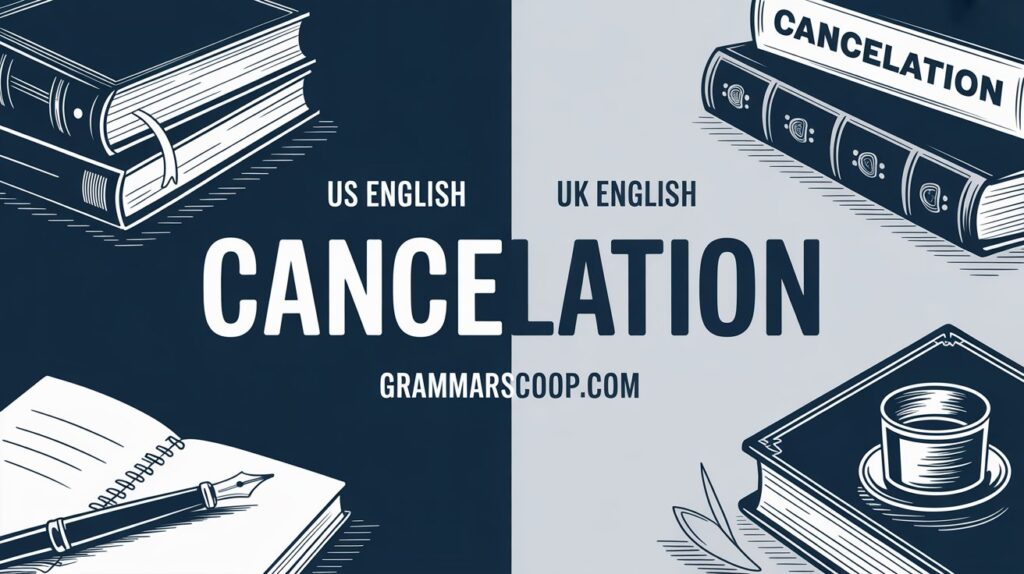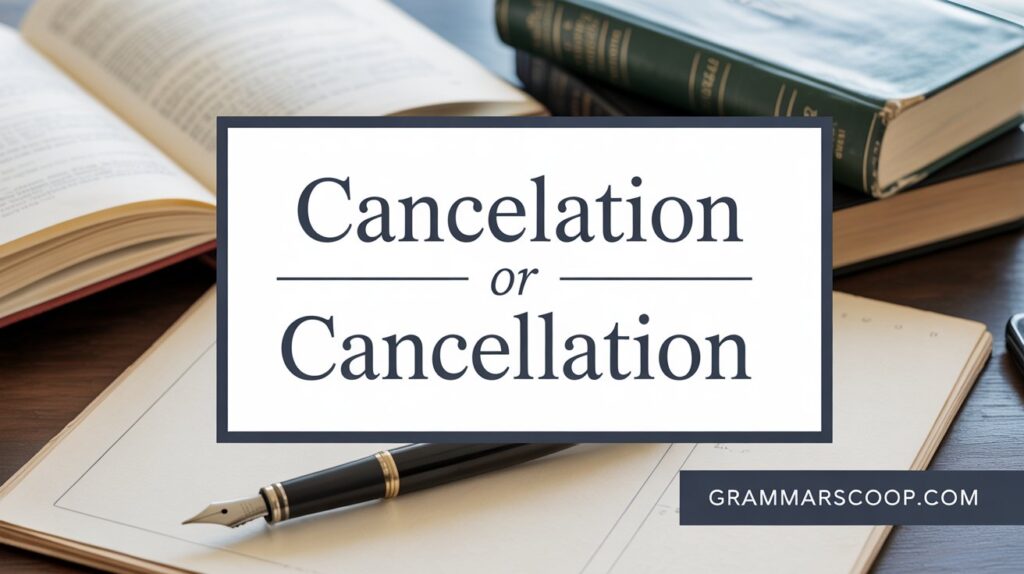In a world where words evolve and spelling rules bend across regions, it’s no surprise that people often pause and wonder: Which is correct: cancelation or cancellation? If you’ve seen both spellings floating around the internet, books, or even official documents, you’re not imagining things.
The spelling of cancellation is one of those sneaky linguistic twists that stir up confusion, especially between American vs British spelling rules. This article digs deep into the difference between the two spellings, explains the reasoning behind them, and clears up the most common questions around this double-L debate.
Quick Answer – Which One’s Right?

If you’re just here for the bottom line, here it is:
The correct spelling of cancellation is “cancellation” with two Ls.
Cancelation with one L is technically a variant spelling, primarily seen in American English, but it’s far less common. Most editors, dictionaries, and style guides recommend sticking with cancellation.
Key Takeaway:
| Spelling | Common In | Preferred Usage |
|---|---|---|
| Cancellation | UK & US (standard) | Formal & academic writing |
| Cancelation | Mostly US (rare) | Informal or outdated usage |
Why the Confusion Between cancellation or cancelation?

The confusion stems from:
- Regional spelling differences between the US and UK
- Inconsistent usage online and in informal writing
- Changes in spelling rules over time
Words like canceled vs cancelled, canceling vs cancelling, and traveling vs travelling often cause similar headaches. They follow the same pattern of single L vs double L based on regional usage. But even within the US, there’s inconsistency.
Many assume both spellings are interchangeable, but there’s a catch: not all spellings are equally accepted by grammar sticklers or style guides. Some spellings appear archaic or regional, making them feel outdated or unusual depending on the reader.
What Does Each Spelling Mean—and Are They Different?
Here’s the interesting part: there’s absolutely no difference in meaning between the two.
Both “cancelation” and “cancellation” refer to:
- The act of calling something off (like a meeting or event)
- The process of annulling or terminating a contract or agreement
- Removing or voiding a scheduled plan or arrangement
Examples:
- “The flight’s cancellation was due to severe weather.”
- “Netflix announced the cancellation of its popular show.”
Whether you use one L or two, the definition doesn’t change.
The difference comes purely from regional preferences and spelling traditions.
American vs. British English: The Spelling Divide

This is where things get more technical.
Why Does American English Prefer Simpler Spellings?
American English has long leaned toward simplification. Noah Webster, the man behind Webster’s Dictionary, championed a spelling reform in the early 1800s. He argued for:
- Dropping unnecessary letters
- Making spelling more phonetic
- Aligning language with American identity
That’s why we have:
- Color instead of Colour
- Honor instead of Honour
- Traveling instead of Travelling
- And yes—Canceled instead of Cancelled
Comparison Table: American vs British Spelling
| Word Type | American Spelling | British Spelling |
|---|---|---|
| Travel | Traveling | Travelling |
| Label | Labeled | Labelled |
| Cancel | Canceled | Cancelled |
| Cancellation | Sometimes Cancelation | Always Cancellation |
So while “cancelation” fits the American pattern of simplification, it’s still not widely adopted, even in the U.S.
Some argue that simplification supports faster learning and consistency, especially for students and non-native speakers. However, most formal settings still prefer the traditional spelling.
cancelation vs cancellation: Which Should You Use and When?
In Professional and Academic Writing
Stick with “cancellation” in any of the following:
- Research papers
- Legal documents
- Business communications
- Journalism
Most style guides — like Chicago Manual of Style, MLA, and APA — recommend “cancellation”.
In Casual or Online Writing
If you’re blogging, texting, or writing casually, you might come across or even use “cancelation”. But be aware: it might look like a misspelling to some readers.
The informal setting does allow for flexibility, but consider the impact of inconsistent spelling on your credibility.
Dictionary Preferences
| Dictionary | Preferred Spelling | Notes |
|---|---|---|
| Merriam-Webster | Cancellation | Lists “cancelation” as variant |
| Oxford English | Cancellation | No variant listed |
| Cambridge | Cancellation | No variant listed |
Online Usage Trends
“Cancellation” appears in over 95% of professional writing, even in the U.S.
Real-World Usage: Examples in Context
Here are examples pulled from published works and public sources:
With “cancellation”:
- “The airline’s cancellation policy was strict.”
- “Subscription cancellation must be done 24 hours in advance.”
- “A sudden cancellation of the press conference shocked reporters.”
- “Event cancellation notifications were sent via email.”
- “Rain caused the cancellation of the outdoor concert.”
With “cancelation”:
- “The unexpected cancelation surprised guests.” (rare)
- “Due to technical issues, there was a cancelation of the service.” (less formal sources)
- “They issued a notice about the program’s cancelation.”
The Etymology of “Cancellation”
Let’s go back in time. The word “cancel” originates from the Latin word cancellare, meaning to cross out with lines. The noun “cancellation” came into English in the late 1400s.
Originally spelled as “cancellatione” in old records, the double-L structure has always been part of its roots. The one-L version is a modern invention, likely from regional spelling shifts.
Timeline of Development:
| Year | Event |
|---|---|
| 1490s | “Cancellation” enters Middle English |
| 1700s | Standardized in British print as “cancellation” |
| 1800s | Noah Webster introduces simplified spellings |
| 1900s–2020s | “Cancelation” appears as a rare American variant |
Is “Cancelation” Actually Wrong?
Not exactly—but it’s definitely not preferred.
Cancelation is a legitimate but rarely used alternative. You’ll find it occasionally in:
- Old American textbooks
- Informal blogs
- Some U.S.-based contracts or internal memos
But in terms of modern language norms, most editors will flag it.
Bottom line:
Use “cancellation” unless you have a specific reason not to.
Synonyms and Alternatives to “Cancellation”
Looking to switch up your vocabulary? Here are synonyms for the word cancellation:
| Synonym | Best Used In |
|---|---|
| Termination | Contracts, employment |
| Revocation | Legal, licenses |
| Suspension | Services, memberships |
| Abandonment | Projects, missions |
| Nullification | Legal agreements, decisions |
Examples:
- “The termination of the agreement was mutual.”
- “Her license was revoked after multiple violations.”
- “They announced the suspension of the monthly newsletter.”
- “The committee voted for the nullification of the old charter.”
Case Studies: How Different Industries Handle the Spelling
Tech Companies
Major tech firms like Google, Amazon, and Microsoft all use “cancellation” in official documentation, user policies, and service agreements.
Legal and Financial Sectors
Legal contracts overwhelmingly use “cancellation”, as precision is key. Using variant spellings can lead to ambiguity or disputes.
Education and Academia
Academic papers, journals, and textbooks universally favor “cancellation”, even when authored by American writers.
Travel and Hospitality
Terms like “cancellation fees” or “free cancellation” dominate hotel and airline websites. “Cancelation” is rarely seen.
Conclusion: Choose Clarity Over Confusion
So, what is the correct spelling: cancellation vs cancelation? It boils down to clarity, professionalism, and consistency.
Stick with “cancellation” across all your writing. It’s the standard, the most accepted, and the least likely to raise eyebrows.
Avoid “cancelation” unless you’re experimenting stylistically or quoting a specific source. Even in American English, the double-L version wins.
“When in doubt, spell it out with two Ls.”
Keep your writing sharp, consistent, and region-aware. And if you’re teaching, editing, or coaching others on correct grammar usage, always point to “cancellation” as the safer, smarter choice.
Bonus: Google Trends and Usage Data
| Spelling | Global Searches | U.S. Searches | U.K. Searches |
|---|---|---|---|
| Cancellation | 90%+ | 88% | 97% |
| Cancelation | ~10% | 12% | 3% |
According to Google Trends, “cancellation” overwhelmingly dominates across all English-speaking countries.
Final Grammar Tip
When dealing with spelling differences like these, always:
- Check your audience’s region (US or UK)
- Follow style guides if you’re writing for publication
- Be consistent throughout your document
Understanding these English language variations saves you from awkward edits and boosts your professional polish.
For those diving into the fascinating world of spelling rules, grammar tips, and the quirks of the English language, remember that awareness and accuracy go hand in hand. Keep practicing, stay curious, and choose the spelling that brings the clearest communication to your audience.

Lisa Morris is a seasoned blogger and language enthusiast with a passion for making grammar simple and engaging. At Grammar Scoop, she shares clear, concise tips that help readers master the rules of English with confidence.






